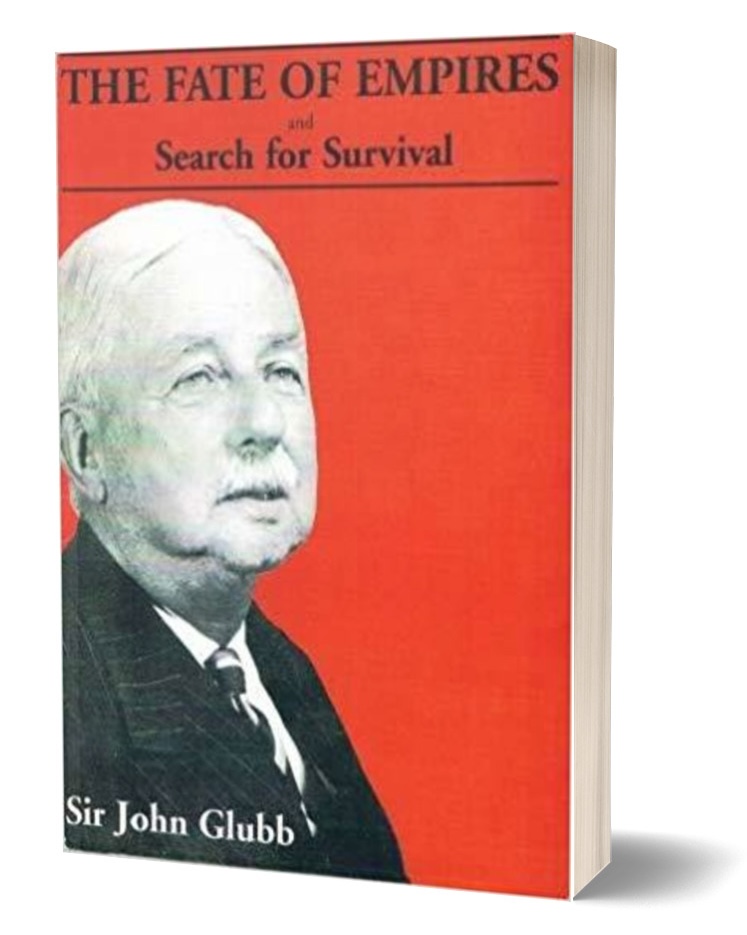The Fate of Empires by Sir John Glubb
Summary and takeaways from the classic paper.
Keywords:
Informed
Sep 29, 2024
This is a classic paper with lessons for emerging communities as well as established empires.

Sir John Glubb "
served throughout the first World War in France and Belgium, being wounded three times and awarded the Military Cross."
"
From 1939 to 1956 he commanded the famous Jordan Arab Legion, which was in reality the Jordan Army. Since his retirement he has published seventeen books, chiefly on the Middle East, and has lectured widely in Britain, the United States and Europe."
This is a classic paper with lessons for emerging communities as well as established empires.
Broad study of History
"
Surely, we ask ourselves, if we studied calmly and impartially the history of human institutions and development over these four thousand years, should we not reach conclusions which would assist to solve our problems today? For everything that is occurring around us has happened again and again before."
Our current education system "
No such conception ever appears to have entered into the minds of our historians. In general, historical teaching in schools is limited to this small island".
"
My plea is that history should be the history of the human race, not of one small country or period."
"
First, our historical work is limited to short periods—the history of our own country, or that of some past age which, for some reason, we hold in respect."
"
Second, even within these short periods, the slant we give to our narrative is governed by our own vanity rather than by objectivity."
"
Third, in the sphere of world history, we study certain short, usually unconnected, periods, which fashion at certain epochs has made popular."
Observations by Sir John Glubb
The key observation by Sir John Glubb is that Age of Empires is around 250 years, and all empires go through same phases in their evolution.
| Empire |
Period |
Years |
| Assyrian Empire |
859-612 B.C. |
247 |
| Persian Empire |
538-330 B.C. |
208 |
| Greek Empire |
331-100 B.C. |
231 |
| Roman Republic |
260-27 B.C. |
233 |
| Roman Empire |
27 B.C.-A.D. 180 |
207 |
| Ottoman Empire |
1320-1570 A.D. |
250 |
| Spainish Colonial Empire |
1500-1750 |
250 |
| Romanov Russia |
1682-1916 |
234 |
| British Empire |
1700-1950 |
250 |
Regarding Rome, "
It is true that the empire survived nominally for more than a century after this date, but it did so in constant confusion, rebellions, civil wars and barbarian invasions."
Technology does not have much influence on age of Empires.
"
An interesting deduction from the figures seems to be that the duration of empires does not depend on the speed of travel or the nature of weapons. The Assyrians marched on foot and fought with spears and bow and arrows. The British used artillery, railways and ocean-going ships. Yet the two empires lasted for approximately the same periods."
Stages of Empires
Stage one. The outburst.
"
a small nation, treated as insignificant by its contemporaries, suddenly emerging from its homeland and overrunning large areas of the world."
"
These sudden outbursts are usually they abound in courage, energy and characterised by an extraordinary display of initiative, overcome every obstacle and energy and courage. The new conquerors are always seem to be in control of the situation. normally poor, hardy and enterprising and above all aggressive. The decaying empires which they overthrow are wealthy but VI The causes of race outbursts The modern instinct is to seek a reason for defensive-minded."
Why the sudden rise of empires?
"
To assign a cause is more difficult."
Greed plays a role.
"
Perhaps the easiest explanation is to assume that the poor and obscure race is tempted by the wealth of the ancient civilisation, and there would undoubtedly appear to be an element of greed for loot in barbarian invasions."
"
Many of the barbarians who founded dynasties in Western Europe on the ruins of the Roman Empire, however, did so out of admiration for Roman civilisation, and themselves aspired to become Romans."
So it is both greed as well as desire for self rule that inspires people.
"
Poor, hardy, often half-starved and ill-clad, they abound in courage, energy and initiative, overcome every obstacle and always seem to be in control of the situation."
Lessons for emerging communities:
abound in courage, energy
characterised by an extraordinary display of initiative,
overcome every obstacle and energy and courage.
The new conquerors are always seem to be in control of the situation.
After initial wave, the challengers become "
organised, disciplined and professional campaigns."
This leads to an Age of Conquests and finally success.
Related articles
The New Silk Roads: The New Asia and the Remaking of the World Order by Peter Frankopan
Empires of the Weak: The Real Story of European Expansion and the Creation of the New World Order
External Links